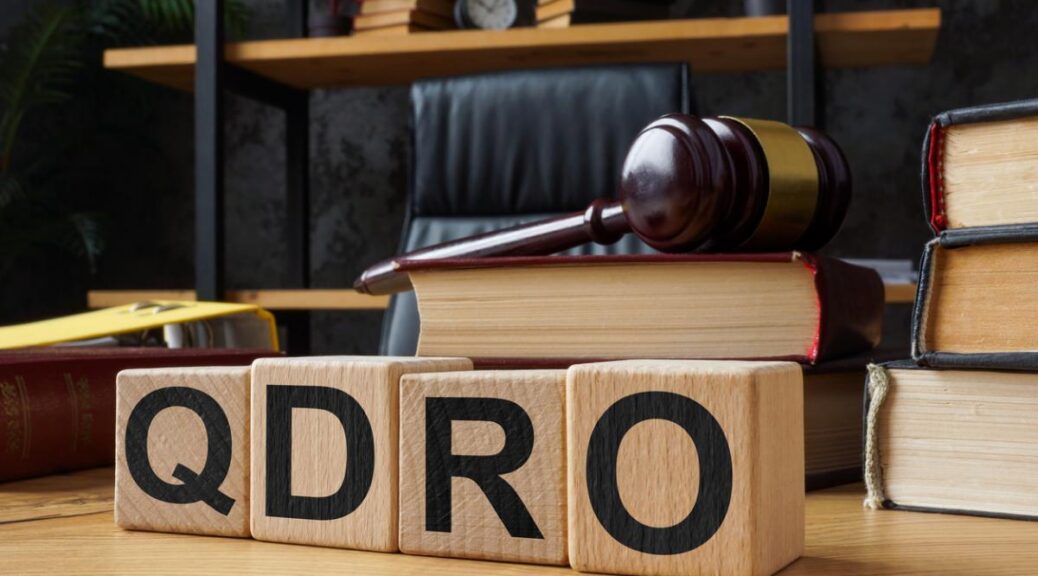Dividing assets during a divorce is rarely simple, but when retirement accounts are involved, the process becomes significantly more complex. If you or your spouse has a 401(k), pension, or other employer-sponsored retirement plan, you’ll likely need a Qualified Domestic Relations Order (QDRO) to divide these assets properly. Understanding QDROs and their critical role in California property divisions can help protect your financial future and ensure you receive your fair share of marital assets.
What Is a QDRO?
A Qualified Domestic Relations Order is a legal document that instructs a retirement plan administrator to divide and distribute retirement benefits between divorcing spouses. The QDRO recognizes the right of an “alternate payee”—typically the non-employee spouse—to receive a portion of the employee spouse’s retirement benefits.
Without a properly executed QDRO, you cannot access your share of your spouse’s retirement accounts, even if your divorce decree states you’re entitled to a portion. The QDRO is the essential bridge between what the court orders and what the retirement plan administrator can legally execute.
Why QDROs Are Essential in California Divorces
California is a community property state, meaning assets acquired during marriage are generally owned equally by both spouses. This includes retirement benefits earned during the marriage, regardless of whose name is on the account. A teacher who worked throughout the marriage has a pension that is jointly owned by both spouses for the portion earned during the marriage. Similarly, a corporate executive’s 401(k) contributions made during the marriage are community property.
However, retirement plans are governed by federal law, specifically the Employee Retirement Income Security Act (ERISA). Plan administrators cannot simply divide accounts based on a divorce decree. They require a QDRO that meets specific legal requirements to authorize the division without triggering tax penalties or violating plan rules.
Types of Retirement Accounts Requiring QDROs
QDROs are required for:
- Most employer-sponsored retirement plans
- 401(k) plans
- 403(b) plans for educators and nonprofit employees
- Traditional pension plans (defined benefit plans)
- Profit-sharing plans
Individual Retirement Accounts (IRAs), however, don’t require QDROs. IRAs can be divided through a process called “transfer incident to divorce,” which is simpler but still requires careful handling to avoid tax consequences.
The QDRO Process: More Complex Than You Think
Creating and implementing a QDRO involves multiple steps and coordination between legal and financial professionals. First, your attorney must determine the value of retirement benefits and calculate the community property portion subject to division. This often requires working with forensic accountants or actuaries, especially for pension plans with complex benefit formulas.
Next, the QDRO document must be drafted with precise language that complies with both federal law and the specific retirement plan’s requirements. Each plan has unique rules and acceptable QDRO provisions. A QDRO that works for one company’s 401(k) plan may be rejected by another plan administrator.
The draft QDRO must be submitted to the plan administrator for pre-approval before submission to the court. This step is crucial because it identifies potential problems before the court issues the order. Once the plan administrator confirms the QDRO is acceptable, it’s submitted to the court for the judge’s signature.
After the court approves and signs the QDRO, it must be submitted to the plan administrator for final implementation. The administrator will then establish separate accounts or payment streams in accordance with the QDRO’s terms. This entire process can take several months to over a year, depending on the plan’s complexity and the administrator’s responsiveness.
Common QDRO Pitfalls and Mistakes
Many divorcing couples underestimate QDRO complexity, leading to costly errors. Some finalize their divorce without addressing the QDRO, assuming they can handle it later. This is dangerous because circumstances can change—the employee spouse might retire, die, or change jobs—potentially complicating or even eliminating the other spouse’s ability to collect their share.
Using generic QDRO templates without customizing them to the specific retirement plan often results in plan administrators rejecting them, causing delays and additional legal fees. Failing to address survivor benefits, loans against the retirement account, or cost-of-living adjustments can also shortchange the non-employee spouse.
Failing to coordinate with tax professionals can lead to unexpected tax consequences. While QDROs allow penalty-free early withdrawal for the alternate payee, income taxes may still apply depending on how the funds are handled.
The Critical Importance of Specialized Legal Expertise
QDROs require a unique combination of family law knowledge, understanding of federal retirement law, and relationships with financial professionals who can accurately value complex retirement benefits. This is where working with a Certified California Family Law Specialist makes an enormous difference.
Judy L. Burger is one of only ten percent of California family law attorneys who have earned certification as a Family Law Specialist through the State Bar of California Board of Legal Specialization. This certification requires extensive experience handling complex family law matters, including property divisions involving retirement accounts and QDROs.
With decades of experience in California family law, Judy Burger has developed strong working relationships with actuaries, forensic accountants, and financial planners who specialize in retirement asset valuation and division. These professional relationships are invaluable when dealing with complex pension plans, executive compensation packages, or multiple retirement accounts.
Her expertise ensures that retirement benefits are accurately valued, that QDROs are properly drafted to meet both legal requirements and plan specifications, that your share of retirement assets is protected throughout the divorce process, and that tax implications are carefully considered and minimized where possible.
Protecting Your Retirement Future
Retirement accounts often represent one of the largest assets in a divorce. Mistakes in handling QDROs can cost you hundreds of thousands of dollars over your lifetime. Whether you’re the employee spouse or the non-employee spouse, proper QDRO handling is essential to protecting your financial security in retirement.
Don’t trust your retirement future to attorneys who lack specialized experience with QDROs or who treat them as an afterthought in the divorce process. The complexity of retirement plan divisions demands focused expertise and attention to detail.
Frequently Asked Questions About QDROs
Q: How long does it take to get a QDRO approved and implemented?
A: The QDRO process typically takes three to twelve months from drafting to final implementation, though complex cases can take longer. The timeline depends on the retirement plan’s responsiveness, the division’s complexity, and whether the draft QDRO requires revisions. Starting the QDRO process early in your divorce, rather than waiting until it is finalized, can significantly reduce delays.
Q: Can I receive my share of the retirement account immediately after the QDRO is approved?
A: It depends on the type of plan and the QDRO’s terms. With a 401(k) or similar defined contribution plan, you can typically request an immediate distribution or rollover to your own IRA after the QDRO is implemented. With a pension (defined benefit plan), you usually must wait until the employee spouse retires or reaches retirement age, though some plans allow earlier distribution under specific circumstances.
Q: What happens if my ex-spouse dies before I receive my share of the retirement benefits?
A: This depends on whether the QDRO includes survivor benefit provisions. A properly drafted QDRO should address this scenario by designating the alternate payee as a survivor beneficiary for their share of the benefits. Without these provisions, you could lose your share entirely if your ex-spouse dies before retirement or before the benefits are distributed.
Q: Do I need a QDRO if we’re dividing retirement accounts in our settlement agreement?
A: Yes. Even if both spouses agree on how to divide retirement accounts, a QDRO is still legally required for employer-sponsored plans. Your settlement agreement establishes what should be divided, but the QDRO is the legal mechanism that actually authorizes the plan administrator to execute that division. One cannot replace the other.
Q: Can a QDRO be modified after it’s been approved?
A: Modifying a QDRO after approval is extremely difficult and often impossible. Once benefits have been paid or accounts divided according to a QDRO, those distributions generally cannot be undone. This is why getting the QDRO right the first time is crucial. Any errors or omissions can have permanent financial consequences, making experienced legal representation essential.
Secure Your Financial Future with QDRO Legal Assistance
Dividing retirement assets is one of the most consequential aspects of your divorce. Don’t leave your financial future to chance or inexperienced handling. The Law Offices of Judy L. Burger provides sophisticated representation for complex property divisions, including those requiring QDROs.
As a Certified California Family Law Specialist with extensive experience and established relationships with financial professionals, Judy Burger has the expertise to protect your interests in retirement asset divisions. Her thorough approach ensures that QDROs are properly prepared, submitted, and implemented to secure your fair share of marital retirement benefits.
Contact The Law Offices of Judy L. Burger today to schedule a consultation about your property division and QDRO needs. Don’t risk your retirement security—get the specialized legal expertise your case deserves. Call our offices or visit our website to take the first step toward protecting your financial future.











